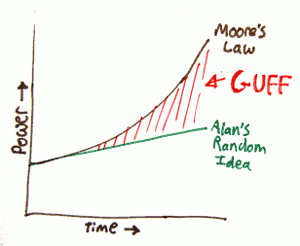Alan's Random Idea
You are probably familiar with Moore's Law - that every year or so the power of computers doubles. I have a theory too, well... more a hypothesis.... ok let's call it a "Random Idea" - about progress in software.
Imagine for a moment you're an engineer working on hard-drive design. Your goal is obvious - you want to cram more stuff in less area on a disk. You want it to work faster and for mobile devices in particular, use less power. It might not be easy to achieve but you know what you're trying to do.
Imagine you're a chip designer. What are your goals? You want to make chips with more stuff in less area, that work faster and use less power.
 So while Moore's Law states that the hardware capability follows a geometric increase, Alan's Random Idea says that software capability increases linearly.
So while Moore's Law states that the hardware capability follows a geometric increase, Alan's Random Idea says that software capability increases linearly.
Imagine you're working on the Microsoft Excel team. What's your goal? You can already embed the kitchen sink in a cell. What are you going to make it do next? Put the cells in a cube instead of a grid? (Hey.. that's actually quite a mad idea... hmm... that's another blog post).
The goals for software, for what we want to do with computers, require more imagination. So REAL software capability progresses linearly.
The area between Moore's curve and mine I call "guff". The not-so essential stuff we waste all our computing power on.
Let me give you an example of what I mean. Do you remember DOS? That thing we had before Windows? Even on an old DOS machine you can run WordPerfect, the word processor and Visicalc the spreadsheet. I bet you could even run an email program on it. A lot of the business value you get from a computer in most small businesses is in doing email, writing documents and working out things in spreadsheets.
Guff, the Great Leap and the Bicycle
The Brompton folding bicycle is a classic in design. Beautifully engineered and fantastically functional. People love Bromptons. You could own one for 10 years and it wouldn't even lose 10% of its value. They're expensive too. At the other end of the spectrum we have the "Cambridge Bicycle". Cambridge must be the world capital of bicycle theft. The un-written rule in Cambridge is you should spend more on your lock than on the bike. And most people don't like to spend more than £20 on a lock. The bikes are atrocious. New-comers to Cambridge at first cower away when they see a typical bike worried that just being near the rusting, brake-less thing might pre-dispose them to having a nasty accident.
At the other end of the spectrum we have the "Cambridge Bicycle". Cambridge must be the world capital of bicycle theft. The un-written rule in Cambridge is you should spend more on your lock than on the bike. And most people don't like to spend more than £20 on a lock. The bikes are atrocious. New-comers to Cambridge at first cower away when they see a typical bike worried that just being near the rusting, brake-less thing might pre-dispose them to having a nasty accident.
However, from a distance... a long distance... (like out in space), the difference in capability between someone with a Brompton and a Cambridge Bike is a lot less than that between having a Cambridge bike and having none at all. However terrible a Cambridge bike may be, it's already made the "Great Leap".
The same is true of the DOS machine, which is the Cambridge Bicycle of the of the computing world. It's also already made the Great Leap between having no computer and having something useful. Moore's Law means that the cost of making the Great Leap becomes, at least in theory, incredibly cheap. The current crop of mobile phones have enough processing power to run a business. In a couple of years time they will be throw-away items.
There are many people in the world who are seriously constrained by resources, who are living on just a few dollars a day. Perhaps Moore's Law and Alan's Random Idea might mean they have a chance, if they can get by without the guff, of making a great leap.
This was the gist of a last minute lightning talk I gave at SPA2010.
